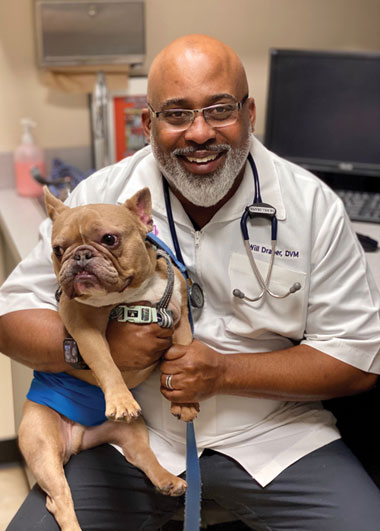How a Veterinary Oncologist helps your pet through their cancer treatment journey
Wiki Article
Comprehensive Guide to the Services Used by a Veterinary Oncologist
Vet oncology encompasses a wide selection of services aimed at treating and diagnosing cancer in pets. Veterinary Oncologist. Oncologists employ sophisticated analysis methods and provide numerous treatment options customized to every pet's needs. They additionally prioritize helpful care and provide important resources for pet dog proprietors. Understanding these services is vital for making notified choices. What specific facets of vet oncology can notably impact an animal's therapy journey?Understanding Vet Oncology
Veterinary oncology is a specialized field concentrated on dealing with and diagnosing cancer cells in pets. This discipline incorporates a vast array of approaches, from medical therapies such as radiation treatment and immunotherapy to medical interventions intended at getting rid of growths. Vet oncologists are trained to recognize the special symptoms of cancer cells in different types, allowing them to tailor therapy strategies to private clients.Along with standard treatments, veterinary oncology highlights helpful treatment, which plays an important duty in enhancing the lifestyle for damaged animals. This consists of discomfort monitoring, dietary support, and palliative treatment choices. Partnership with family pet proprietors is critical, as they are integral to decision-making regarding their animals' treatment courses. As study advancements, veterinary oncology remains to develop, offering new hope and boosted results for family pets identified with cancer cells. Overall, this area is essential for resolving the intricacies of cancer cells in friend animals.
Advanced Diagnostic Techniques
Advanced analysis techniques play a crucial function in vet oncology, supplying essential insights into the existence and level of cancer cells in pets. Imaging methods such as ultrasound, CT scans, and MRI are commonly used to picture tumors and examine their characteristics. In addition, biopsy procedures are vital for obtaining tissue examples, allowing for conclusive diagnosis and tailored treatment strategies.Imaging Modalities Utilized
Imaging modalities play a crucial duty in the diagnosis and management of cancer cells in animals. Veterinary oncologists make use of different innovative imaging techniques to analyze growth dimension, transition, and presence. Radiography, or X-rays, uses a preliminary view of bone and breast conditions, while ultrasound supplies real-time imaging of soft tissues, allowing for in-depth examination of interior organs. Computed tomography (CT) improves visualization of complex physiological structures and allows 3D reconstructions, aiding in accurate lump localization. Magnetic vibration imaging (MRI) is vital for soft cells distinction, especially in mind tumors. Furthermore, nuclear medication methods such as positron exhaust tomography (FAMILY PET) help identify metabolic task within growths. Jointly, these methods enhance diagnostic accuracy, directing efficient therapy strategies for oncological patients.Biopsy Procedures Explained
Complying with the initial analysis through imaging techniques, obtaining a definitive diagnosis commonly calls for cells tasting through biopsy procedures. Veterinary oncologists utilize numerous biopsy strategies based upon the lump's location and qualities. Fine needle ambition (FNA) is a minimally intrusive approach that extracts cells for cytological examination, perfect for superficial masses. Core needle biopsies supply bigger cells samples and are useful for deeper tumors, permitting histopathological analysis. Surgical biopsies involve excising a portion or the entire growth, promoting thorough analysis. These procedures not just verify the existence of cancer cells yet additionally aid establish its type and grade, guiding treatment decisions. Each biopsy strategy is selected meticulously to balance analysis precision with client security and convenience.Treatment Alternatives for Cancer Cells in Pet dogs
When an animal is identified with cancer, a range of treatment alternatives end up being offered to aid improve and handle the disease lifestyle. Vet oncologists generally recommend a multidisciplinary method customized to the private pet's requirements, which might include surgery, radiation treatment, immunotherapy, or alternate treatments.Surgical treatment is often used to remove growths and afflicted cells, potentially leading to total remission in some situations. Radiation therapy aims to damage and target cancer cells, minimizing lump dimension and minimizing signs and symptoms - Veterinary Cancer Specialist. Immunotherapy utilizes the family pet's body immune system to combat cancer cells better, while alternate therapies could include acupuncture or organic supplements to sustain total health
Each treatment alternative carries its very own advantages and risks, and veterinary oncologists work closely with pet dog proprietors to design a comprehensive plan that aligns with the animal's particular diagnosis and the proprietor's desires. The best objective is to boost the pet's convenience and high quality of life throughout their cancer cells trip.
Radiation treatment for Animals
Chemotherapy is a typical treatment alternative for pet dogs identified with cancer cells and is frequently utilized together with other therapies outlined by veterinary oncologists. This treatment involves the management of particular medications made to destroy and target cancer cells, thereby decreasing lump dimension and stopping the spread of the disease. Vet oncologists customize radiation treatment procedures based upon the kind of cancer, the pet dog's total wellness, and the preferred therapy end result.Adverse effects can happen, as these medicines might also impact healthy cells. Usual responses consist of queasiness, vomiting, and momentary adjustments in appetite - Pet Cancer Surgery. Veterinary oncologists are outfitted to manage these adverse effects efficiently, making sure the pet's convenience throughout the treatment procedure. Normal surveillance via blood examinations and follow-up visits is vital to analyze the family pet's reaction to chemotherapy and make necessary modifications. Inevitably, chemotherapy can offer considerable benefits, improving the quality of life for pets encountering cancer medical diagnoses

Radiation Therapy in Veterinary Medication
Radiation therapy acts as a reliable treatment choice for animals identified with local lumps, providing a targeted method to cancer administration. This strategy makes use of high-energy radiation to damage the DNA of cancer cells, hindering their capability to proliferate. It is particularly beneficial for tumors that are not open to surgical elimination or for cases where surgical treatment may not be practical as a result of the growth's area.Vet oncologists customize radiation procedures based upon lump type, size, and place, as well as the pet's total health. Therapy can be provided by means of exterior light beam radiation or brachytherapy, each with distinct benefits. Generally, numerous sessions are called for to make best use of efficiency while decreasing adverse effects.
Pets might experience momentary reactions such as skin irritation, the overall goal is to diminish lumps and ease signs browse around here and symptoms, inevitably enhancing the animal's prognosis and high quality of life. Accordingly, radiation treatment plays a vital duty in detailed cancer cells treatment.
Palliative Care and Lifestyle
Palliative care in veterinary oncology concentrates on improving the lifestyle for family pets dealing with incurable ailments, guaranteeing comfort and self-respect in their last days. This specialized technique prioritizes discomfort management, symptom control, and psychological assistance. Veterinary oncologists assess each pet's specific requirements, tailoring interventions to ease discomfort and boost overall well-being.Strategies might consist of providing medications for discomfort alleviation, managing queasiness, and dealing with various other stressful signs and symptoms. Additionally, dietary assistance is frequently offered to preserve strength and enhance hunger. The psychological element of palliative care is equally important; creating a tranquil setting helps decrease stress and anxiety for both animal and proprietor.
Inevitably, the goal of palliative care is to allow pet dogs to enjoy their remaining time with as much pleasure and self-respect as possible. By concentrating on convenience and lifestyle, veterinary oncologists play a vital role in making certain that animals and their households browse this tough trip with concern and understanding.
Support for Family Pet Owners During Therapy

Emotional Advice for Proprietors
Charting the psychological landscape throughout an animal's cancer cells therapy can be a frustrating experience for owners. The unpredictability surrounding diagnosis and diagnosis can lead to sensations of stress and anxiety, helplessness, and despair. Veterinary oncologists recognize the relevance of psychological support and frequently provide assistance to help proprietors browse this hard journey. Communication is vital; reviewing therapy options and potential results can reduce some concerns. Additionally, providing reassurance that psychological feedbacks stand fosters a supportive atmosphere. Lots of oncology facilities may additionally suggest support system or therapy services customized for family pet proprietors, helping with common experiences. Urging proprietors to prioritize self-care throughout this time around is essential, as their psychological wellness directly influences their animal's convenience and here total treatment experience.
Resources and Educational Products
Guiding with the intricacies of a pet's cancer cells treatment can be intimidating for proprietors, making access to dependable sources and academic products essential. Veterinary oncologists commonly supply a range of handouts, sales brochures, and online products that clarify treatment options, possible side results, and care techniques. These resources help debunk the procedure and encourage pet proprietors to make enlightened choices. Additionally, several oncology centers use access to sustain discussion forums and groups where owners can get in touch with others dealing with comparable challenges, promoting a sense of neighborhood. Educational webinars and workshops performed by veterinary professionals better boost understanding, making certain that proprietors are well-appointed to navigate their animal's trip via cancer cells therapy with self-confidence and knowledge.Frequently Asked Concerns
How Can I Prepare My Pet for a Vet Oncology See?
Preparing a family pet for a vet oncology see includes event clinical documents, keeping in mind symptoms, and ensuring the pet dog is comfy. A calm behavior and familiar products can assist reduce stress and anxiety during the visit.What Are the Indicators My Pet Dog May Have Cancer Cells?
Signs that a pet may have cancer consist of inexplicable weight loss, relentless throwing up or looseness of the bowels, uncommon lumps or swellings, sleepiness, adjustments in hunger, trouble breathing, and alterations in behavior. Prompt vet interest is necessary.How Can I Assistance My Pet Dog Emotionally During Treatment?
Supporting a family pet psychologically throughout therapy includes providing comfort, keeping regimens, using gentle love, and ensuring a tranquil environment. Taking part in silent play and routine friendship aids ease tension and promotes a sense of see page safety.Exist Alternate Therapies for Pets With Cancer cells?
Different therapies for animals with cancer cells include acupuncture, herbal therapies, and dietary support. These approaches may complement traditional treatments, advertising overall wellness. Consulting with a vet is necessary for reliable and risk-free assimilation of alternative treatments.What Costs Should I Anticipate for Vet Oncology Providers?
The awaited costs for vet oncology solutions can vary substantially, commonly influenced by diagnostics, treatments, and ongoing treatment. Pet owners ought to get ready for costs varying from assessments to specialized therapies, mirroring the complexity of cancer administration.Partnership with pet owners is critical, as they are integral to decision-making regarding their family pets' therapy paths. Each therapy choice brings its very own benefits and threats, and veterinary oncologists work very closely with animal proprietors to develop a detailed plan that straightens with the animal's details medical diagnosis and the owner's wishes. Pets might experience short-lived reactions such as skin irritability, the total goal is to diminish lumps and alleviate signs and symptoms, eventually enhancing the animal's diagnosis and high quality of life. Assistance for animal proprietors during therapy is essential in guiding through the psychological obstacles connected with an animal's cancer cells diagnosis. Preparing a family pet for a vet oncology check out involves gathering clinical documents, keeping in mind symptoms, and guaranteeing the pet dog is comfy.
Report this wiki page